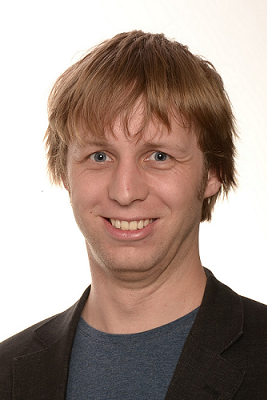Prof. Dr. Thomas Zeume
Logic and formal verification
Professor / Chair management
Address:
Ruhr-University Bochum
Faculty of Computer Science
Logic and formal verification
Universitätsstr. 150
--D-44801 Bochum
Room: MC 1/65
Telephone: +49 (0)234 32-19609
Office Hours: By arrangement
E-Mail: Thomas.Zeume@rub.de

Curriculum Vitae
Since October 2021: Professorship for Logic and Formal Verification,Faculty of Computer Science, Ruhr University Bochum
October 2020 - September 2021: Professorship for Logic and Formal
Verification, Faculty of Mathematics, Ruhr University Bochum
April 2020 - September 2020: Assistant Professorship for Logic and Formal
Verification, Faculty of Mathematics, Ruhr University Bochum
2009-2020: Scientific assistant, Faculty of Computer Science, TU Dortmund
Courses
- Logic in computer science
- Model checking
- Complexity theory
- Automata theory
- Thomas Schwentick, Nils Vortmeier, Thomas Zeume: Sketches of Dynamic Complexity. SIGMOD Record, 2020
- Slides: Thomas Zeume: An Update on Dynamic Complexity. ICDT 2018
- Thomas Schwentick, Thomas Zeume: Dynamic complexity: recent updates. SIGLOG News 3(2): 30-52 (2016)
- Thomas Zeume: Small Dynamic Complexity Classes. PhD thesis. 2015.
- Szymon Toruńczyk, Thomas Zeume: Register Automata with Extrema Constraints, and an Application to Two-Variable Logic. LICS 2020
- Thomas Zeume and Frederik Harwath: Order-Invariance of Two-Variable Logic is Decidable. LICS 2016. (Extended version)
- Thomas Schwentick and Thomas Zeume: Two-Variable Logic with Two Order Relations. Logical Methods in Computer Science. 2012.
- Ahmet Kara, Thomas Schwentick, and Thomas Zeume: Temporal Logics on Words with Multiple Data Values. FSTTCS 2010: 481-492 (Extended version)
- Gaetano Geck, Christine Quenkert, Marko Schmellenkamp, Jonas Schmidt, Felix Tschirbs, Fabian Vehlken, Thomas Zeume: Iltis: Teaching Logic in the Web. 2021. (unpublished)
- Gaetano Geck, Artur Ljulin, Sebastian Peter, Jonas Schmidt, Fabian Vehlken, Thomas Zeume: Introduction to Iltis: An Interactive, Web-Based System for Teaching Logic. To be presented at ITiCSE 2018.
Research
RESEARCH INTERESTSMy research focuses on theoretical computer science, in particular on computational logic and its applications in database theory, complexity theory and formal verification. In my research, I also explore how the teaching of theoretical computer science can be assisted by modern technologies.
QUERYING DYNAMIC DATABASES
Extracting information from vast amounts of data that are frequently updated is a major challenge in many disciplines. Dynamic complexity theory studies the theoretical foundations of logical query languages for databases that are subject to frequent changes. A major goal of this area is to develop a theory for classifying queries in terms of the number of resources needed to evaluate them dynamically.
In my research, I (a) develop methods for determining the number of resources needed to update query results in this dynamic context, and (b) investigate the structure of small dynamic complexity classes and their relationship to traditional static complexity classes.
A good start to the area:
FOUNDATIONS OF LOGICS FOR SPECIFICATION AND VERIFICATION
Automated verification of software and hardware is an important task. Often intended properties of a system are specified by logical formalisms that navigate along traces of the system. Similar formalisms are the basis for query languages for extracting information from XML documents and graph databases.
In my research, I explore logical systems with respect to their applicability for such tasks. I design customlogics and explore their basic algorithmic properties for reasoning tasks as well as their expressivity. One focus has been on extensions of the two-variable fragment of predicate logic, where we obtained a classification of the computational complexity of the satisfiability problem.
Selected articles:
WEB-SUPPORTED TEACHING IN THEORETICAL COMPUTER SCIENCE
Courses on theoretical computer science are typically among the hardest for computer science students. Improving motivation and understanding in these courses is therefore an important goal. For increasing learning outcomes in STEM disciplines (science, technology, engineering, and mathematics) the National Research Council of the US advocates, among others, to “Make classrooms interactive, both to engage students and to provide dynamic feedback in situ;” and to “Leverage technologies to make the most effective use of students’ time, shifting from information delivery to sense-making and practice in class.”. This raises the question of how theoretical computer science education can benefit from modern technologies and student-centered teaching methods.
I am convinced that we, as computer scientists, need to address this challenge in order to provide our students with the best learning opportunities. In our group we develop the web-based teaching support system Iltis for theoretical computer science courses. A prototypical system for logic-related content is already available.
Try it: An interactive logic course
Selected articles:
